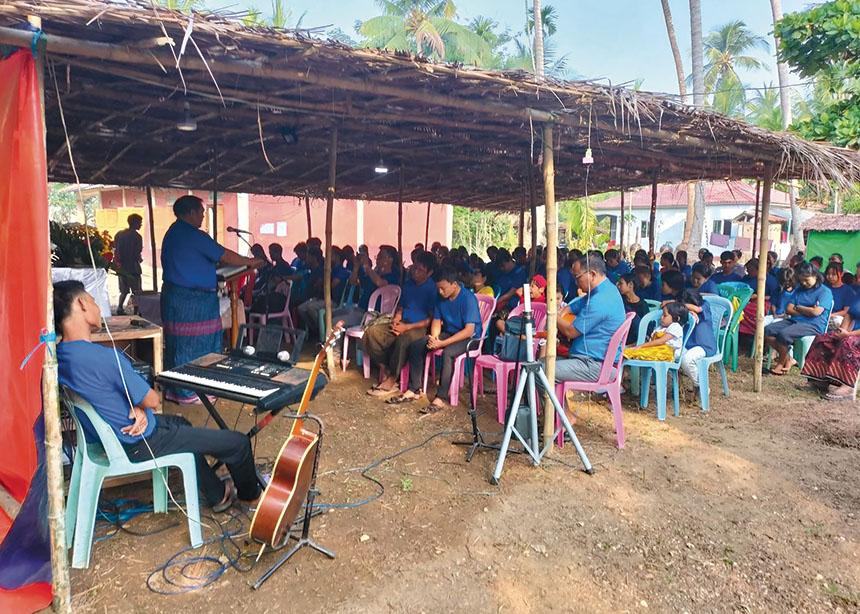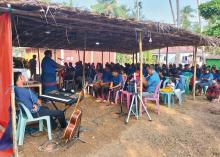I was recently tasked with writing a “giving catalogue” that will highlight various activities of Mennonite Church Canada International Witness. For some organizations, this would be easy—one goat costs $15—but how do you reduce leadership development and mentoring, relationship building and the development of Asian-based, post-colonial peace theology into easy bite-size, or wallet-size, pieces?
Part of me rails against this reductionist way of viewing our relationships with the global church, but another part of me knows the fun of giving to something specific with tangible results.
One example is the series of youth peace conferences recently held in Myanmar by the Bible Missionary Church (Mennonite). With the education system in chaos following the military coup in February 2021, and increased pressure put on youth to join the armed resistance to seek revenge for atrocities and bombing campaigns in many communities, Mennonite church leaders wanted to gather youth together to discuss these life and death issues. They wanted to dig deep into Jesus’ way of peace as outlined in scripture.
They gathered in several locations to worship and study the Bible together. Multi-generational groups studied with the youth, who designed and signed pledges to reject armed resistance and to refuse to bear arms, even for self-defence. Many young people asked for baptism, so impromptu baptism services were held.
No Mennonite Church Canada teachers were involved in this training. We didn’t organize or train trainers. Our role was rather mundane: we bought the chairs. Meeting under a woven bamboo roof in an outdoor space, they needed chairs. Lacking a consistent electricity supply, they needed solar lights. We bought the chairs; we bought the lights—that’s it. Yet they would say that we are partners with them in this peace training.
In a recent edition of Africa Journal, a publication of Africa Inter-Mennonite Mission, Bruce Yoder describes what it means to be partners.
“With the partnership paradigm, the advancement of God’s reign on earth was to be through the creation of new partners and the subsequent collaborative ministry through which together they could contribute to what God was doing in the world. It was . . . about being the global church in mission together. . . . We do not know what tomorrow will look like. At present, we start by sitting together around the table, worshipping, testifying to what God is doing in our midst, and as we move forward envisioning what God is calling us to.”
It is hard to put this into a giving catalogue. It doesn’t add up to a neat ledger. It is sometimes a web of connections and relationships seated around a potluck table of gifts and resources. We contribute what we have, and sometimes that is only chairs and lights.
The 2023 Giving Catalogue, and other resources for International Witness Sunday (October 15), are coming soon to mennonitechurch.ca/IW-Sunday.
Jeanette Hanson serves as director of International Witness for Mennonite Church Canada.
Read more From Our Leaders columns:
Are pick-and-shovel prayers still tearing through God’s rooftop?
The idol of neutrality
Time to be a champion
‘Camp shapes people’
Jesus and the 4 Cs




Comments
Jeanette Hanson's profound narrative showcases the essence of meaningful collaboration in global church missions. The simplicity of providing chairs and lights for the Mennonite youth peace conferences in Myanmar reflects a deeper partnership in fostering peace, mentorship, and spiritual guidance. It emphasizes that true collaboration isn't merely about material contributions but about shared values and collective efforts in advancing God's work. Hanson's perspective beautifully underscores the intricate connections and relationships that weave together to support vital initiatives. Her account invites reflection on the diverse forms of support that contribute to a unified mission of peace and understanding.
Add new comment
Canadian Mennonite invites comments and encourages constructive discussion about our content. Actual full names (first and last) are required. Comments are moderated and may be edited. They will not appear online until approved and will be posted during business hours. Some comments may be reproduced in print.